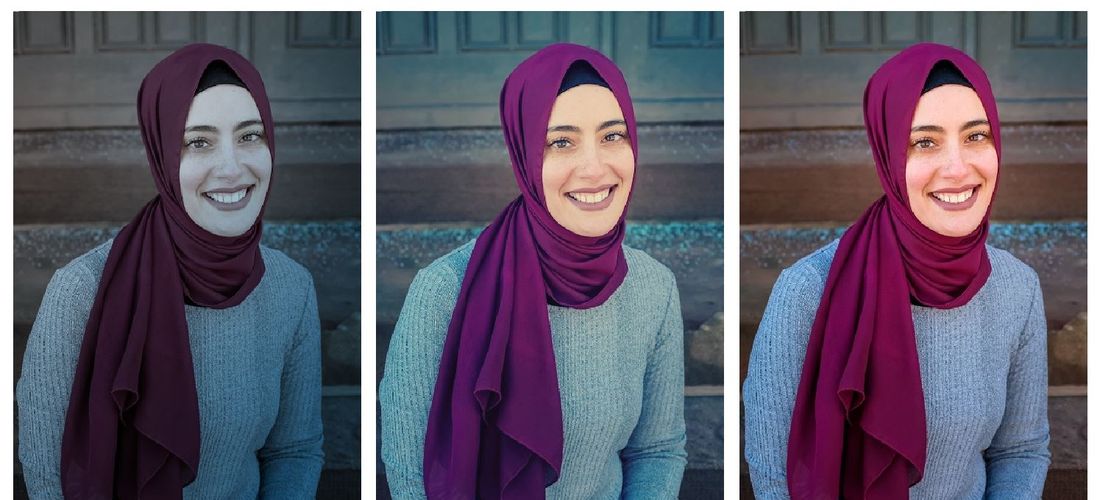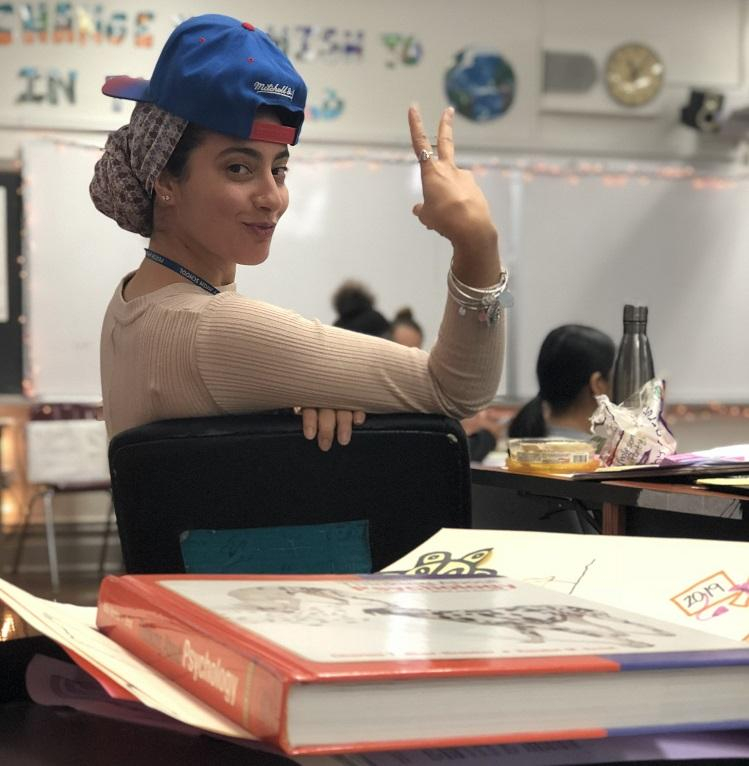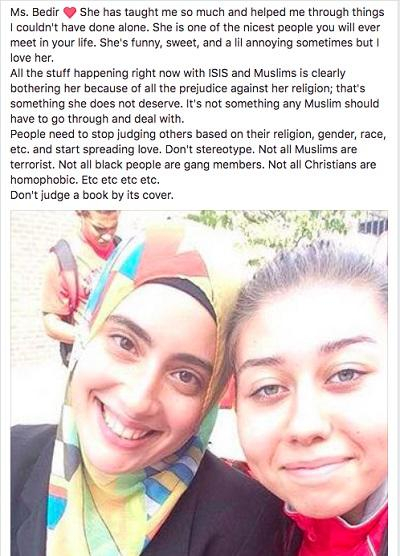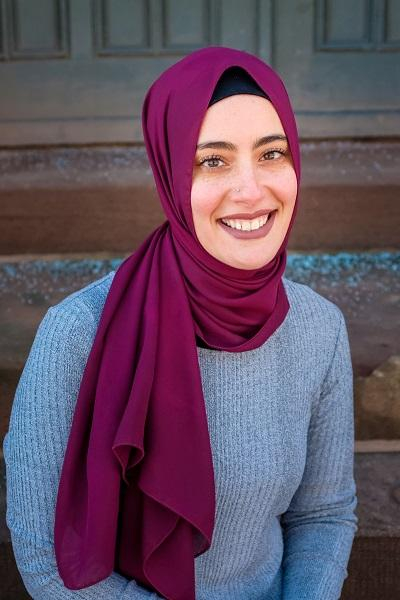Teaching While Muslim – Lessons in Breaking Stereotypes & Building Friendships
Faith
|
May 7, 2019
|
8 MIN READ

Educator Nagla Bediri
Editor's note: In honor of National Teacher's Day and Teacher Appreciation Week, we'd like to honor educator Nagla Bedir. In this inspiring essay, the public high school teacher shares stories and lessons learned from her time in the classroom as the only Muslim, hijab-wearing educator in her school.
By Nagla Bedir
I always say exposure is everything — but I couldn’t have known just how powerful it could be. To be a Muslim, hijab-wearing public school teacher is to be an educator first and foremost, but also an ambassador (of sorts) of Islam to my students and colleagues without preaching one word about the faith. And, I know I’m not the only one in this position in this country.

High school teacher Nagla Bedir in her classroom.
The impact of having a Muslim teacher is different depending on the school. If there are any Muslim students, then that teacher gives students hope and someone to look up to who shares a similar identity. It may give those students an example of a Muslim person establishing themselves as a pillar of American society, something that media and bigots too often work hard to prevent.
Then there’s my situation. I teach in a school where I can count the Muslim students in the entire district on one hand. For my students, it is an entirely different experience to have me as a teacher. I am the only woman who wears hijab in the entire district, from staff to students, and although that might seem intimidating (sometimes it is), it has been one of the most rewarding experiences of my life.
I work in an urban district with an overwhelmingly Latinx and Christian student body. For most of my students, I am the first woman who wears a hijab with whom they have ever interacted. Once they get comfortable with me, they ask me a thousand questions:
“Miss, do you wear that in the shower?”
“Miss, what do you wear when you go to the beach?”
“Miss, do you have to take it off when you get married?”
They ask me questions about hijab, my culture and my religion, but also about my personal life, family, dreams and goals. I have had countless conversations with my students over the years answering all of their questions and holding nothing back. Through their questions they get to see how similar I am to them, but they also come to understand the struggles I face as a Muslim and Arab woman in the United States.
The Power of Knowing One Muslim
My students and I form connections that often amaze me and warms my heart. I am often times their “second mom,” older sister or a shoulder to lean on. For me, my students are the children I didn’t give birth to but whom I love as if I did. Their love has been a pillar in my life since I first started student teaching seven years ago. This bond has made my students incredibly protective of me, my identity and my religion.
When they hear anyone talking negatively about Islam, they jump to defend it and cite me as a reason why. I have never asked my students to defend me or any aspect of my identity, but because of our bonds, they feel passionately about fighting people’s bigotry. They are personally offended by the bigotry because of their knowing one Muslim woman - me.

One year, a student came to school on a Monday excited to tell me a story about what happened at her job over the weekend. She worked at the mall at a froyo place, and she told me that she heard two people talking in her store about what was going on in the world. Apparently the son was looking at his phone about something that happened and the woman began ranting, telling her son to stay away from "people like that" in his school and telling him not to be friends with Muslims - that "even if they are nice, the children, their parents and their whole families are terrorists.”
At this point my student was overwhelmed with anger, and she proceeded to firmly tell these people that what they were saying was "very disrespectful" and that "just because some terrorists are Muslim doesn't mean all Muslims are terrorists, and I personally know someone who isn't.”
Another kid chimed in saying "Miss, see! What I sent you the other day about teenagers knowing better than adults that not all Muslims are terrorists! It's true!" They are so proud of themselves when they stand up for what’s right.
It fills me with hope.
One of my former students is currently in her sophomore year at Kean University. In one of her classes, she had to choose a topic to research and do a presentation. She decided to work on Islamophobia in the United States. Her professor wanted her to change her topic to how Muslims contribute to terrorist attacks, and she was livid. She argued with the professor until he agreed to her original topic.
I was so proud of her for putting her foot down. She proceeded to create an amazing presentation that discredited any link between Islam and terrorism. This was an exchange after she finished telling me about her presentation:
Another year, two students came running to me after one of their teachers (as in, one of my coworkers) told the class that "Muslim women shouldn't be able to wear hijabs and burkas for safety reasons." When the students argued with her about the absurdity of her statement, she argued back and stood her ground. The next day they were so excited to show me posts they made on social media, as seen above.
It’s Not Always Sunshine Though
Teaching while Muslim is not always filled with positive experiences, and sometimes I am not enough. I recently carried out a lesson in my psychology class about the power of labeling. I put six pictures of men on the board with labels that varied from “violent” to “doctor.” The students were tasked with writing a three sentence story about each of the people in the pictures.
Immediately, one of my students shouted that they didn’t like this activity because they didn’t know any of those people, so how could they write a story about them? Five minutes later, this same student studied the image of a stereotypically-looking Muslim man labeled as “violent” and shouted, “Miss, I don’t trust that guy. I don’t trust people from Afghanistan and Pakistan.”
In the discussion that ensued, some students tried to argue that stereotyping that man was wrong, but others argued that while Muslim women were fine, Muslim men are inherently violent and especially against the women in their lives. It dawned on me in that moment that I am not enough. The exposure to just one Muslim person actually may enforce this narrative that I am the exception to the stereotypes and their preconceived boxes.
Sometimes my students, however, make the decision to meet more Muslims on their own. Just a few months ago, one of my former students named Nathalie Tejeda invited me to her university to sit on a panel for an event that the Muslim Student Association was hosting on Muslim Women’s Day. Nathalie is not a Muslim, but SHE joined her university’s Muslim Student Association. I cannot express how it felt to watch my student be filled with such deep empathy - it was one of the highlights of my career.
These are just a handful of encounters I have had with my students. The impact of my identity on my students is not lost on me. I do not share these stories for praise or to give myself any props. I have had amazing human beings as students for years, and their hearts and open minds are what led to them reacting so passionately. But, I had no idea that they would build empathy so powerful that it would lead to them standing up and speaking out in concrete ways.
In our collective fight against racism, Islamophobia, etc., people have suggested many different avenues, methods and strategies. Exposure is definitely not always enough. But for many of my students, that is all it took. Maybe there is something to be said for just “getting to know one Muslim.” If the students in our schools have more Muslim teachers, more teachers with diverse identities, races, ethnicities, and backgrounds, then maybe - just maybe - they’ll help build a different, more accepting world than the one that we currently live in.

Being a hijabi teacher in a school system with very few other Muslims comes with many challenges. I feel this weirdly important responsibility to always be put together and always stylish in how I dress. It comes with the burden of feeling like you represent 1.6 billion people, that any mistake I make could be potentially be blamed on my religion. It also means dealing with microaggressions from adults and sometimes students about my ethnicity and about my religion.
It means that sometimes staff and students upon meeting me for the first time, before I even open my mouth, assuming that I am a foreigner and that I have a heavy accent. It means that in the teacher’s lounge when the news is on and there is a terrorist attack being reported on, my co-workers begin to look at me specifically to watch my reaction. Being a hijabi teacher also means that I have to be 20 times better than the teacher next door and always on point. It means an enormous pressure to always watch what I say.
For me, being a hijabi teacher also means the obligation to always speak up when I see injustice. It means advocating for truth, social justice and putting my students at the center of everything I say and do. It means that I have an even larger responsibility to teach from anti-racist and social justice-based lenses.
My advice to fellow Muslim teachers is to always be unapologetic about who you are. Advocate for yourself and for your students and remember that ultimately you do not actually have the burden of representing almost two billion people. Seek out other Muslim educators (you can also join Teaching While Muslim!) to talk about the microaggressions you experience and figure out how to maneuver difficult situations.
You are not alone - it is important to know that.
Nagla Bedir is the founder and executive director of Teaching While Muslim. She is a high school social studies teacher in New Jersey. She holds a Bachelor’s Degree in History and Psychology from Rutgers University, a Master’s Degree in Social Studies Education from the Graduate School of Education - Rutgers University, and a Master’s Degree in Educational Administration from Grand Canyon University. A version of this post originally appeared on Teaching While Muslim.
Subscribe to be the first to know about new product releases, styling ideas and more.
What products are you interested in?

